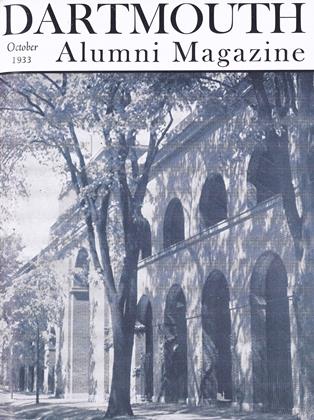During Commencement an announcement was first made that a committee appointed by the President and Trustees of the College, at the request of the Dartmouth Christian Association, had recommended that this association give way to a new organization to be known as the Dartmouth Union. The committee, made up of alumni, members of the faculty, and undergraduates, was appointed to study the question of what form of religious organization could best meet the needs of the Dartmouth student body. After several months of conferences among the members of the committee and with others most directly concerned, it was the unanimous opinion that the new organization should be so designed as to direct undergraduates toward the common objective of "uniting in appropriate activity those students interested in finding the place of religion in life." The committee in its report to the President and Trustees drew up a statement of purpose for the proposed Union as follows:
I. The name "Dartmouth Union" is adopted as suggesting:
(a) The spirit of unity and sympathy between sects and points of view which have been exclusive in the past.
(b) Union of faculty and students; an enterprise of the community, not of some division of the community.
II. Recognizing that religion is, to a large extent, a private activity, personal, emotional, spiritual, in any case individual, the Dartmouth Union
l. Does not attempt to define religion.
2. Does not attempt nor desire to organize and standardize private religious life or its expression.
3. Does not ally itself with any sect, creed, or philosophy, but is hospitable to the adherents of any, or of none.
4. Does not infer that its members have to possess religious beliefs, experiences, or needs, except the need to understand moral and religious forces at work on the minds of our generation.
5. Does not as a working method, recognize the authority of age and official position, but accepts democratic discussion as among equals.
III. Recognizing that religion has for modern life social and moral implications that are the concern of intelligent groups as well as the concern of individuals, the Dartmouth Union
1. Does believe that understanding of religious and moral values is a legitimate concern of college men.
2. Does believe that critical world conflicts are being fought on frontiers of ethical conduct, integrity, and ideals; and that "the origins and effects" of these conflicts should have a place in higher education. That men aspiring to leadership in any field of public life today must deal with such world-activities as:
(a) Intolerance: Religious, racial, cultural. (b) Integrity in business, politics, and the professions. (c) International peace and International goodwill. (d) Propaganda and the mobilization of opinion. (e) Standards for sex-life, homelife, camps activity, etc.
3. Does believe that interest in religion and morality includes interest in irreligion and immorality, and that the campus should hear from time to time the opinions of leading agnostics, atheists, communists, or representatives of any other point of view significant in the modern world.
4. Does believe that the humanitarian impulse is a part and product of all healthy religious life, and will sponsor and support projects for relief and helpfulness in the neighborhood as occasion demands and facilities permit.
Members of the organizing committee of the Union consisted of: Prof. Roy B. Chamberlin, Prof. William A. Eddy, Sidney C. Hayward '26, Prof. Arthur B. Meservey 'O6, Prof. Edwin Powers, Prof. George F. Thomas, Charles E. Griffith 'l5, Parker T. Hart '33, Jerry A. Danzig '34, Seymour B. Dunn '34, Robert H. Michelet '34, George H. Colton '35, and Aldis P. Butler '36. The cabinet which is charged with the direction of the Union for 1933-34 is made up of Emerson Day '34, Seymour B. Dunn '34, Carl B. Hess '34, George H. Colton '35, Robert M. Kugler '35, and Aldis P. Butler '36.
With supervisory authority vested in them by the alumni committee of the Dartmouth Christian Association, three alumni were elected at the June meeting of the General Association to membership on the Dartmouth Union Council, the board of directors of the new organization. These newly chosen members, W. M. Ross 'O9, C. E. Griffith 'l5, and S. C. Hayward '26, will represent the alumni in working out a program for the Union. At a meeting to be held this month, the Union Council will discuss questions concerning its program and plans for the year. The Director of Chapel, Prof. R. B. Chamberlin, is charged with the guidance of the activities of the Union.
 View Full Issue
View Full Issue
More From This Issue
-
 Article
ArticleHANOVER BROWSING
October 1933 By Rees H. Bowen -
 Article
ArticleNEW COLLEGE RESPONSIBILITIES
October 1933 By Ernest Martin Hopkins -
 Class Notes
Class NotesClass of 1930
October 1933 By Albert I. Dickerson -
 Article
ArticlePRESIDENT'S ADDRESS TO THE ALUMNI
October 1933 -
 Article
ArticleARE WE GOING TO WIN?
October 1933 By Pat Holbrook '20 -
 Class Notes
Class NotesClass of 1910
October 1933 By Harold P. Hinman







